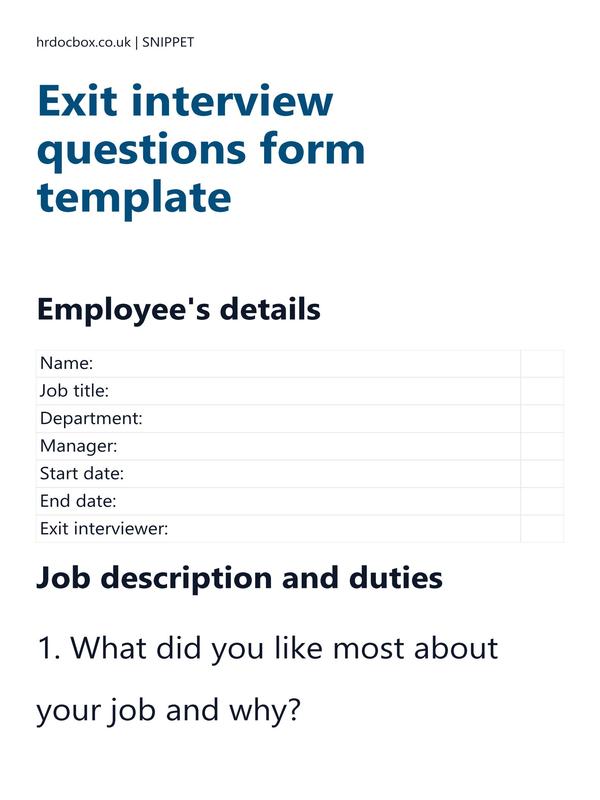Exit interview questions form template


Our exit interview questions form template contains 38 questions for a thorough and structured approach to gathering valuable feedback from departing employees.
- Includes Exit interview questions form template + 12 months’ access, with all updates to this page provided free of charge and notified to you.
- UK-specific accuracy.
- 1,094 words over 3 pages.
- Last updated 09/03/2025.
- Format: Word / XLS / plain text / email.
- Delivery: Instant download after purchase (no physical item).
- Access: Download link shown here after checkout.
- This Exit interview questions form template will SAVE you up to 2 hours drafting & research. Save cost. Reduce risk.
Exit interview questions
Employee's details
| Name: | |
| Job title: | |
| Department: | |
| Manager: | |
| Start date: | |
| End date: | |
| Exit interviewer: |
Job description and duties
1. What did you like most about your job and why?
2. What did you like least about your job and why?
3. Do you feel that the job description given to you when you took the job on accurately describes the role?
4. Were your duties clearly described to you when you took on the role?
5. Have your
This is a 10% preview of the Exit interview questions form template. For instant full access, purchase this item or a parent bundle.
Exit interview questions form template
If an employee is leaving, use this model form template in an exit interview to ask questions about their experience, and their reasons for leaving the organisation.
There is no legal requirement to conduct an exit interview, but they can provide you with some useful information about underlying issues within your organisation.
Practical application of a Exit interview questions form template
- The Exit interview questions form template should be actioned / delivered no later than 1 week before the employee leaves the organisation.
- It is sent / delivered by an employer / HR team to an employee.
Compliance
Compliance
This Exit interview questions form template incorporates relevant UK laws and HR standards, including those listed below:
-
Data protection: Employers must comply with the requirements of the General Data Protection Regulation (GDPR) when collecting and processing personal data from employees. This means that employers must obtain consent from employees before collecting their personal data, and must ensure that the data is stored securely and used only for the purposes for which it was collected.
-
Discrimination: Employers must ensure that exit interview questions do not discriminate against employees on the basis of any protected characteristics, such as age, gender, race, religion, or sexual orientation.
-
Confidentiality: Employers must ensure that the information collected during the exit interview is treated confidentially and is only shared on a need-to-know basis. This means that only those individuals who need to see the information should have access to it.
-
Exit interview process: Employers must ensure that the exit interview process is fair and consistent for all employees, and that employees are not treated unfairly or discriminated against on the basis of their employment status or any other factors.
Exit interview questions workflow
Exit interview questions workflow
Check which resources should be implemeted before and/or after the Exit interview questions form template, to understand the workflow.
Exit interview meeting script
Our Exit Interview Meeting Script Template streamlines the process, ensuring comprehensive feedback and valuable insights for organisational improvement.
Exit Interview Summary Report
Use this if you require a robust and practical Exit Interview Summary Report template.
Timings
Timings
Follow these best practice actions to get the most from the Exit interview questions form template, guiding you before, during, and after implementation:
Instantly unlock with a purchase.
Instantly unlock with a purchase.
| Step | Description | Responsibility | Timing |
| 1 | Notify the departing employee about the exit interview. | HR/Manager | Before last day |
| 2 | Schedule the exit interview meeting. | HR/Manager | Before last day |
| 3 | Conduct the exit interview using the Questions Form. | HR/Manager | Ideally, no later than 7 days before employment ends |
| 4 | Gather and record the employee's feedback and responses. | HR/Manager | During interview |
| 5 | Analyse the feedback to identify areas for improvement. | HR/Management | After interview |
Practical example
Practical example
Instantly unlock with a purchase.
Instantly unlock with a purchase.
Scenario: Implementation of Exit Interview Questions Form
ABC Limited, a UK-based company, recognises the importance of gathering feedback from departing employees through exit interviews. HR Manager Sarah leads the implementation of an Exit Interview Questions Form, ensuring that HR conducts all exit interviews to maintain confidentiality and enable departing employees to discuss issues openly.
Initiating the Process
Sarah initiates the process by developing the Exit Interview Questions Form in collaboration with HR staff. The form aims to gather comprehensive feedback on various aspects of the employee experience, including reasons for leaving, overall satisfaction levels, and suggestions for improvement.
Form Development
Sarah and the HR team design the Exit Interview Questions Form, tailoring it to ABC Limited's culture and values. The form includes open-ended questions that allow departing employees to express their thoughts freely and confidentially. It also incorporates questions about the employee's interactions with their manager and any issues they may have encountered.
Rollout and Implementation
Once the Exit Interview Questions Form is finalised, Sarah ensures that HR staff are trained on how to administer the form effectively. She communicates clear instructions for scheduling and conducting exit interviews and establishes protocols for maintaining confidentiality throughout the process.
Monitoring and Evaluation
Sarah monitors the effectiveness of the Exit Interview Questions Form by reviewing the feedback gathered from departing employees. She analyses the data to identify common themes and trends, which are then used to inform strategic decisions and improve the employee experience.
Reporting and Action Planning
Sarah prepares reports summarising the findings from exit interviews and presents them to senior management. Together, they develop action plans to address any issues identified and implement changes to enhance employee retention and satisfaction.
Continuous Improvement
Sarah iteratively updates the Exit Interview Questions Form based on feedback from departing employees and changes in organisational needs. She ensures that the form remains relevant and effective in capturing valuable insights that drive continuous improvement.
Frequently Asked Questions about a Exit interview questions form template
Frequently Asked Questions about a Exit interview questions form template
-
Can I use this template in my small business?
Yes. The Exit interview questions form template is designed to be flexible and suitable for organisations of all sizes, including small businesses and charities. It follows UK employment law best practice, so even if you don't have an in-house HR team, you can confidently apply it.
-
Is the Exit interview questions form template compliant with 2026 UK employment law?
Absolutely. All of our templates are drafted with the latest ACAS guidance and UK employment legislation in mind. We review and update them regularly, so you can be confident they remain compliant.
-
Can I customise it for my organisation?
Yes, we highlight the areas that you need to update with your own details, and where you need to make decisions to suit your situation. This saves you time and ensures that you meet best practice.
-
Do I get instant access?
Yes. Once purchased, you'll be able to download it instantly. Templates are provided in editable Word or Excel format so you can customise them easily, and in PDF format for easy sharing.
-
What if I need more help, not just this template?
If you're looking for broader support, we also offer toolkits and library bundles that include this template, along with other HR templates and policies for fully managing your situation. These may be more cost-effective if you need deeper advice.
-
Why should I use this, and not AI to generate this template?
The risk of using a free AI-generated template 'without review' includes your legal exposure, missing context, and no awareness of the wider process. Purchasing from us mitigates that risk.
